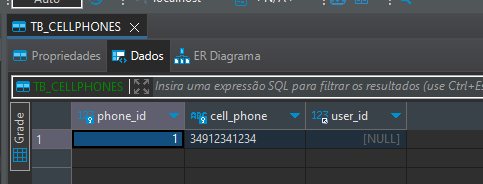Oi pessoal, resolvi fazer um relacionamento many to one, só que o campo do id de relacionamento fica null no banco de dados.

package com.igaopk.userapi.users.entitys;
import jakarta.persistence.*;
import lombok.Data;
import lombok.Getter;
import lombok.Setter;
import java.io.Serializable;
@Entity(name = "cellphone")
@Table(name = "TB_CELLPHONES")
@Getter
@Setter
@Data
public class CellPhone implements Serializable {
@Id
@Column(name = "phone_id", unique = true)
@GeneratedValue(strategy = GenerationType.IDENTITY)
private int id;
@Column(name = "cell_phone")
private String cellphone;
@ManyToOne(fetch = FetchType.LAZY, cascade = CascadeType.ALL)
@JoinColumn(name = "user_id" )
private User user;
public CellPhone() {
}
public CellPhone(String cellphone) {
this.cellphone = cellphone;
}
@Override
public boolean equals(Object obj) {
if(obj instanceof String){
var phone = (String) obj;
return this.getCellphone().equals(phone);
}
if(obj instanceof CellPhone objCellphone){
return objCellphone.getId() == this.getId();
}
return false;
}
}
package com.igaopk.userapi.users.entitys;
import com.igaopk.userapi.users.dtos.CreateUserDTO;
import com.igaopk.userapi.users.dtos.UserDTO;
import com.igaopk.userapi.users.mappers.CellPhoneMapper;
import jakarta.persistence.*;
import lombok.Data;
import lombok.EqualsAndHashCode;
import lombok.Getter;
import lombok.Setter;
import org.springframework.security.core.GrantedAuthority;
import org.springframework.security.core.authority.SimpleGrantedAuthority;
import org.springframework.security.core.userdetails.UserDetails;
import org.springframework.security.crypto.password.PasswordEncoder;
import java.util.ArrayList;
import java.util.Collection;
import java.util.List;
@Table(name = "TB_USERS", schema = "public")
@Entity(name = "user")
@Data
@Getter
@Setter
@EqualsAndHashCode(of = "id")
public class User implements UserDetails {
@Id
@Column(name = "user_id", unique = true)
@GeneratedValue(strategy = GenerationType.IDENTITY)
private Long id;
@Column(name = "full_name")
private String fullName;
@Column(name = "user_name", unique = true)
private String userName;
@Column(name = "user_password")
private String password;
@OneToMany(mappedBy = "user", cascade = CascadeType.ALL, fetch = FetchType.LAZY)
private List<CellPhone> cellPhones = new ArrayList<>();
public User() {
}
public User(String fullName, String userName, String password, List<CellPhone> cellPhones) {
this.fullName = fullName;
this.userName = userName;
this.password = password;
this.cellPhones = cellPhones;
}
public User(CreateUserDTO createUserDTO) {
this.fullName = createUserDTO.fullName();
this.userName = createUserDTO.userName();
this.password = createUserDTO.password();
this.cellPhones = CellPhoneMapper.parseCellPhoneToObject(createUserDTO.cellPhones());
}
public void encryptPassword(PasswordEncoder passwordEncoder) {
this.password = passwordEncoder.encode(this.password);
}
public void update(UserDTO userDTO) {
if (!userDTO.fullName().isBlank()) {
this.fullName = userDTO.fullName();
}
if (!userDTO.password().isBlank() || userDTO.password().length() < 4) {
this.password = userDTO.password();
}
if (!userDTO.cellPhones().isEmpty()) {
for (String cellphone : userDTO.cellPhones()) {
List<String> newCellphones = new ArrayList<>();
var cache = this.cellPhones.stream().toList();
if (!cache.contains(cellphone)) {
newCellphones.add(cellphone);
}
this.cellPhones.addAll(CellPhoneMapper.parseCellPhoneToObject(newCellphones));
}
}
}
@Override
public Collection<? extends GrantedAuthority> getAuthorities() {
return List.of(new SimpleGrantedAuthority("ROLE_USER"));
}
public String getPassword() {
return password;
}
@Override
public String getUsername() {
return this.userName;
}
@Override
public boolean isAccountNonExpired() {
return true;
}
@Override
public boolean isAccountNonLocked() {
return true;
}
@Override
public boolean isCredentialsNonExpired() {
return true;
}
@Override
public boolean isEnabled() {
return true;
}
}


